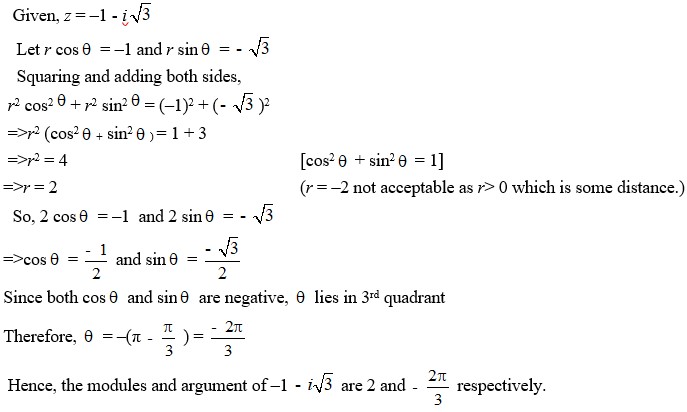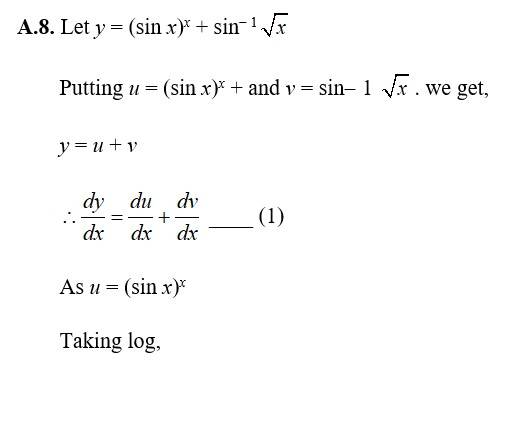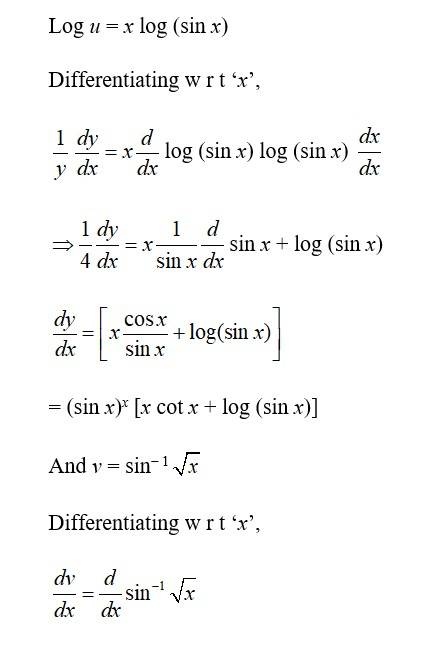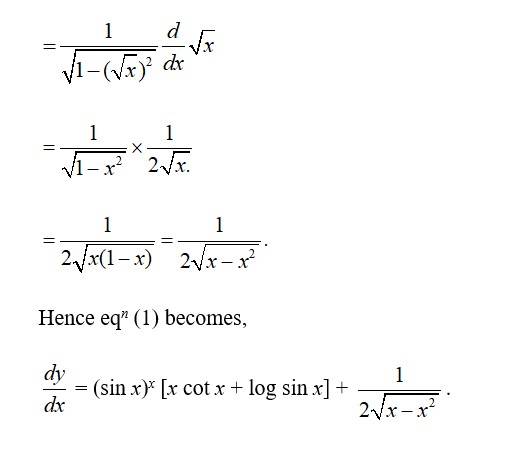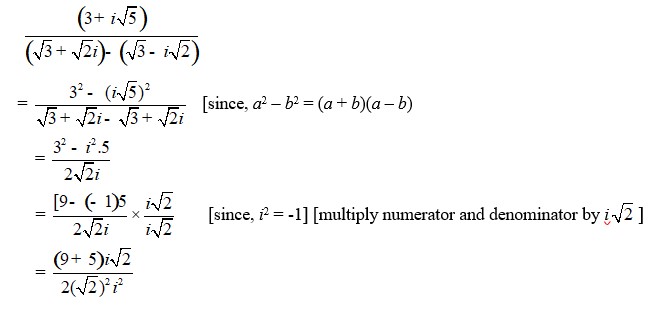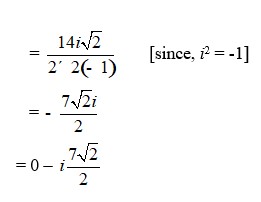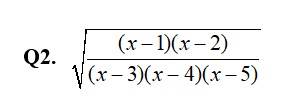Maths
Get insights from 6.5k questions on Maths, answered by students, alumni, and experts. You may also ask and answer any question you like about Maths
Follow Ask QuestionQuestions
Discussions
Active Users
Followers
New answer posted
6 months agoContributor-Level 10
77. Let y = x sin x + (sin x) cos x
Putting u = x sin x and v = (sin x) cos x we have,
y = u + v
_____ (1)
As u = x sin x
Taking log,
Log u = sin x log x
Differentiating w r t 'x',
,
= sin x log x + log x sin x
= + cos x log x
= x sin x
And v = (sin x) cos x
Taking log,
Log v = cos x log (sin x).
Differentiating w r t 'x',
= cos x log (sin x) + log (sin x) cos x
sin x- sin x log (sin x)
= cot x cos x- sin x log (sin x)
= v [cot x cos x - sin x log (sin x)]
= (sin x) cos x [cot x cos x- sin x log (sin x)]
Hence, eqn (1) becomes
+ (sin x) cos x [cot x cos x- sin x log (
New answer posted
6 months agoContributor-Level 10
75. Let y = (log x)x + x log x.
Putting u = log xx and v = x log x we get,
y = u + v
.____ (1)
As u = log xx
Taking log,
Þlog u = x [log(log x)]
Differentiating w r t x we get,
log (log x) + log (log x)
= + log (log x)
=
= (log x)x
= (log x)x- 1 [1 + log ´. log (log x)]
And v = log x
Taking log,
Log v = log x log x. = (log x)2.
Differentiating w r t 'x' we get,
= 2v log x
= 2. x log x.
= 2 x log x- 1 log x.
Hence eqn becomes
= (log x) x- 1[1 + log x log (log x)] + 2x log x- 1 log x
New answer posted
6 months agoContributor-Level 10
74 . Let y = +
Putting u = and v = we get,
y = u + v
_____ (1)
As u =
Taking log,
= log u = x log
Differentiating w r t 'x' we get,
+ log 1.
And v = x
Taking log, log v = log x
Differentiating W r t 'x',
log x + log x
+ log x
= v =
Hence, eqn (1) becomes,
New answer posted
6 months agoContributor-Level 10
73. Let y = (x + 3)2 (x + 4)3 (x + 5)4.
Taking loge on both sides,
log y = log (x + 3)2 + log (x + 4)3 + log (x + 5)4
= 2 log (x + 3) + 3 (log (x + 4) + 4 log (x + 5).
So,
Q log y = [2 log (x + 3) + 3 log (x + 4) + 4 log (x +5)]
= (x + 3)2 (x + 4)3 (x + 5)4
New answer posted
6 months agoContributor-Level 10
72. Let y = xx - 2 sin x
Putting u = xx and v = 2 sin x.
So, y = u - v
= ____ (i)
As u = xx
Log u = x log x.
So, log u = x log x.
=
x´ + log x.
= 1 + log x
= = 4 [1 + log x] = xx [1 + log x].
And v = 2sin x Log v = sin x log 2.
(sin x log 2)
sin x log 2 + log 2 = log 2. cos x.
= v log2 cos x.
= v log 2 cos x
= 2 sin x log2. cos x.
Q Eqn (i) becomes, = xx (1 + log x) - 2 sin x cos x log 2.
New answer posted
6 months agoContributor-Level 10
71. Let y = (log x) cos x
Taking loge on both sides,
Log y = cos x [log (log x)]
Differentiating w r t 'x' we get,
log (log x) +log (log x)
+ log (log x) (- sin x)
- sin x log (log x)
=
New answer posted
6 months agoContributor-Level 10
70. Kindly go through the solution

Putting value of y from the above we get,

Taking an Exam? Selecting a College?
Get authentic answers from experts, students and alumni that you won't find anywhere else
Sign Up on ShikshaOn Shiksha, get access to
- 65k Colleges
- 1.2k Exams
- 679k Reviews
- 1800k Answers

